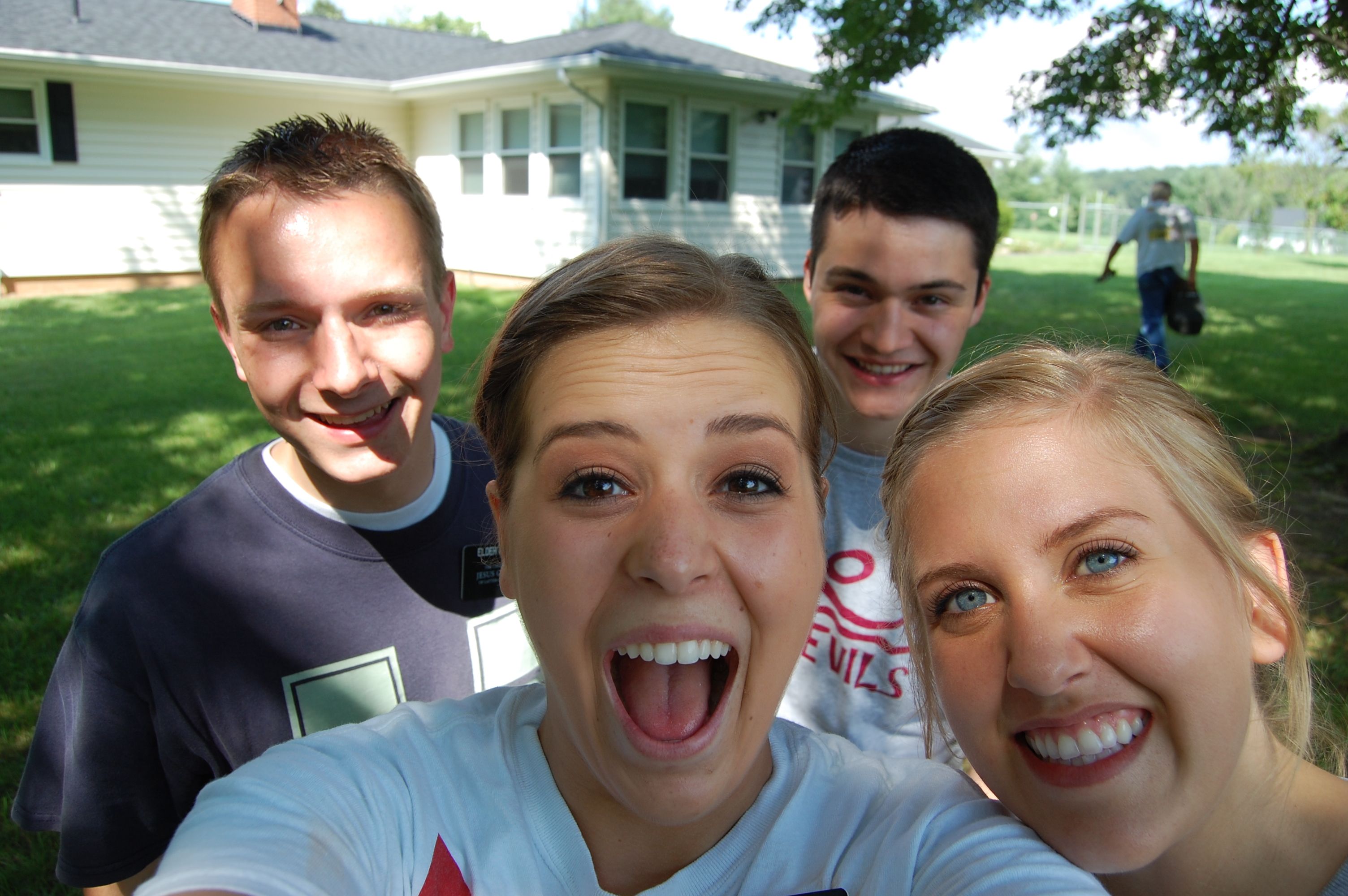
A day in the life of missionaries in Woodstock, Virginia
[mashshare]
In June, I spent a full day trailing two Spanish-speaking elders serving full-time missions for The Church of Jesus Christ of Latter-day Saints.
The experience was a memorable, educational whirlwind and exposed my readers to the unpredictable nature of volunteer missionary work in a multicultural, fast-paced area.
On Friday, July 11, eager to appreciate the differences in work in diverse areas, I scheduled a similar adventure with the full-time missionaries serving in my own backyard — Woodstock, Virginia. Though we’re in the same mission as our friends in Baltimore, the backdrop for the work couldn’t be more different.
The Woodstock Ward (congregation) part of the Winchester Virginia Stake (like a diocese) sits in the middle of Shenandoah County and is blessed with two sets of full-time missionaries. We have a phenomenal companionship of both elders and sisters, and while they live in tiny Woodstock — population 5,000 — they are responsible for a county with 42,000 people spread across 513 square miles.
For perspective, the missionaries I joined in Baltimore work in a city with a density of 7,671 people per square mile. I witnessed firsthand how they encounter more people every day than they could possibly talk to. In Woodstock, the missionaries labor in an area with just 67 residents per square mile.
My day began by coordinating schedules with Elders Kenneth Kuhn of Las Vegas and Spencer Jensen of Lewiston, Utah; and Sisters Briana Moore of The Woodlands, Texas, and Brook Swisher of Brentwood, California. I planned to bounce back and forth between them throughout the day, helping as much as I could without becoming a distraction or overstepping my role.
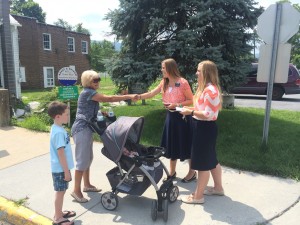 After their studies, I was scheduled to meet the sisters for an appointment with a friend in the town of Strasburg, another small town at the northern edge of their massive area. Much to their disappointment, and despite confirming the appointment the night before, the woman wasn’t home. With an hour free before lunch, and already having used 15 of their preciously allotted monthly driving miles, they decided to contact people on the street for an hour.
After their studies, I was scheduled to meet the sisters for an appointment with a friend in the town of Strasburg, another small town at the northern edge of their massive area. Much to their disappointment, and despite confirming the appointment the night before, the woman wasn’t home. With an hour free before lunch, and already having used 15 of their preciously allotted monthly driving miles, they decided to contact people on the street for an hour.
In Baltimore, this would mean near nonstop contacts on the bustling streets. In Strasburg, this meant walking a full block without passing anyone. I caught up with them on the sidewalk and we made our way north. Soon Sister Swisher, perhaps one of the most irrepressibly bubbly and positive missionaries ever to wear a tag, was gushing over an infant in a stroller. (It is said that if Sister Swisher laughs in Virginia, her family hears it in California. This is unconfirmed.)
The woman pushing the stroller, Janet, was very impressed by the sisters and agreed to a visit. Already the sisters were wondering if the earlier missed appointment had been divine design.
 We stepped into an indoor flea market and I introduced the missionaries to the owner, Sally, a relative of a local church member. They chatted freely and the sisters expressed genuine concern when learning that Sally’s husband recently passed away. Before we left, Sally accepted an invitation for a visit to discuss what the church believes about the eternal nature of families and the importance of temples.
We stepped into an indoor flea market and I introduced the missionaries to the owner, Sally, a relative of a local church member. They chatted freely and the sisters expressed genuine concern when learning that Sally’s husband recently passed away. Before we left, Sally accepted an invitation for a visit to discuss what the church believes about the eternal nature of families and the importance of temples.
Although the sisters had packed a lunch, we felt prompted to step into a Mexican restaurant across the street. After the sisters were seated, I invited the server, Jose, to give them three minutes before they left for the beginning of the most important message he might ever hear. He agreed, and I left the sisters to their lunch. They reported later that, indeed, he had listened and had passed along his name and address to meet with the elders for a more formal discussion.
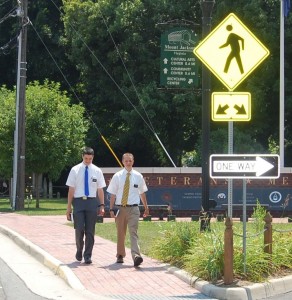 Next, I met Elders Kuhn and Jensen in Woodstock. To save them miles, as members often do, I drove them to the small town of Mount Jackson. They’d long wanted to street contact in the quaint community, but had never had an opportunity. Their large area and a mileage limit means carefully budgeting each month. While biking is possible in and around Woodstock, driving or finding rides with members are the best options to and from the other small towns in the rural county.
Next, I met Elders Kuhn and Jensen in Woodstock. To save them miles, as members often do, I drove them to the small town of Mount Jackson. They’d long wanted to street contact in the quaint community, but had never had an opportunity. Their large area and a mileage limit means carefully budgeting each month. While biking is possible in and around Woodstock, driving or finding rides with members are the best options to and from the other small towns in the rural county.
We walked together for a block and a half before passing anyone on our side of the street and stepped into a quiet gift shop. After browsing for a few minutes and making small talk with the owner, Jensen, a seasoned, confident elder, explained their purpose and asked the owner if he would like to hear their “unique message.” He took their name and number on a pass-along card, but politely declined. After several more minutes, we said goodbye.
 We dashed across the street and the elders approached a Hispanic woman. Kuhn, who is serving a Spanish-speaking mission and speaks extraordinarily well for being in the field less than a year, introduced us and described their work. The woman, Enriqueta, asked what differentiated The Church of Jesus Christ of Latter-day Saints from her Catholic faith. With impressive poise and conviction, Kuhn laid out a few key differences and before we walked away, the woman gave her address and accepted an invitation for a weekend visit.
We dashed across the street and the elders approached a Hispanic woman. Kuhn, who is serving a Spanish-speaking mission and speaks extraordinarily well for being in the field less than a year, introduced us and described their work. The woman, Enriqueta, asked what differentiated The Church of Jesus Christ of Latter-day Saints from her Catholic faith. With impressive poise and conviction, Kuhn laid out a few key differences and before we walked away, the woman gave her address and accepted an invitation for a weekend visit.
Running late, we hurried back to Woodstock for an appointment with a family they’d met a few days prior. When we finally arrived at the apartment complex, the family was in the parking lot struggling with a large desk they needed carried to their second-floor apartment. Both the husband and wife have health problems and they were thankful for the elders’ help. Though they were then unable to meet with the missionaries, they expressed gratitude for their service and asked them to return the next day.
“That was my favorite experience,” Kuhn said when we later recapped our time together. “We arrived at exactly the time we needed to be there. It really taught me that the Lord’s plans always come before our own and that they are often nothing like what we were expecting. We just have to try our best and he’ll help us with what we missed.”
Jensen, a talented district leader, agreed. “Heavenly Father knows where each one of his children is, and I believe he places us in their paths. We just need to have the faith and courage to share with them this message of happiness.”
Meanwhile, the sisters had another key appointment fall through, this time with a less-active member they’ve been working with for quite some time. It was obvious they weren’t disappointed for themselves, but for her.
 As is common in many missions, we spent some time in the afternoon performing service. The ward mission leader and his wife, Jerry and Christine Clipp, arranged for us to help a neighbor cut and clear a large, fallen branch. Jim Heishman, another local member, provided the chainsaw and completed the team. Many hands handled the work in only an hour.
As is common in many missions, we spent some time in the afternoon performing service. The ward mission leader and his wife, Jerry and Christine Clipp, arranged for us to help a neighbor cut and clear a large, fallen branch. Jim Heishman, another local member, provided the chainsaw and completed the team. Many hands handled the work in only an hour.
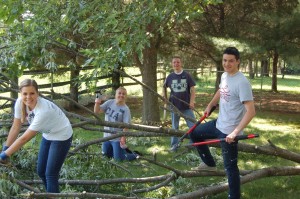 Jeanne, the 88-year-young neighbor, was delighted with the missionaries’ energy and enthusiasm. There were no expectations and not a whiff of pressure to teach or even return. There were, however, hugs for the sisters and handshakes for the elders. (I, of course, took a hug. How could I not?)
Jeanne, the 88-year-young neighbor, was delighted with the missionaries’ energy and enthusiasm. There were no expectations and not a whiff of pressure to teach or even return. There were, however, hugs for the sisters and handshakes for the elders. (I, of course, took a hug. How could I not?)
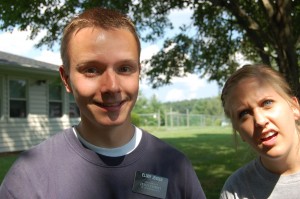 After changing back into dresses, shirts and ties, the sisters and elders survived dinner at my family’s home and we discussed how their day compared to missionaries serving in places like Baltimore. They referenced their daily goal of inviting 20 people to hear more, a recent challenge from Elder M. Russell Ballard, and how challenging it is in a place where they might only see 20 people from dawn to dusk. And that’s counting their companion.
After changing back into dresses, shirts and ties, the sisters and elders survived dinner at my family’s home and we discussed how their day compared to missionaries serving in places like Baltimore. They referenced their daily goal of inviting 20 people to hear more, a recent challenge from Elder M. Russell Ballard, and how challenging it is in a place where they might only see 20 people from dawn to dusk. And that’s counting their companion.
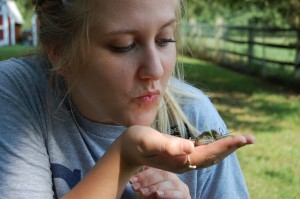 Soon I was racing out the door with the elders to meet with a family in Edinburg, another small town outside of Woodstock. The family’s trials and challenges were heartbreaking, and I was touched by the young elders’ empathy for situations they cannot yet begin to understand. Before my time with the elders came to a close, Jensen moved swiftly to hand a card to a jogger and invited her to visit the church’s website.
Soon I was racing out the door with the elders to meet with a family in Edinburg, another small town outside of Woodstock. The family’s trials and challenges were heartbreaking, and I was touched by the young elders’ empathy for situations they cannot yet begin to understand. Before my time with the elders came to a close, Jensen moved swiftly to hand a card to a jogger and invited her to visit the church’s website.
“Thank you!” she said sincerely and without breaking stride.
“You never know,” he smiled.
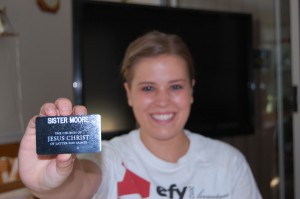 While the elders went to visit a member family, I met the sisters at the home of a recent convert, Sue, in Tomsbrook, yet another small town on the other side of Woodstock. Sue’s love for the missionaries is written in her country-mile-wide smile. They each shared a favorite scripture with Sue and watched a “Mormon Message” on the church’s website.
While the elders went to visit a member family, I met the sisters at the home of a recent convert, Sue, in Tomsbrook, yet another small town on the other side of Woodstock. Sue’s love for the missionaries is written in her country-mile-wide smile. They each shared a favorite scripture with Sue and watched a “Mormon Message” on the church’s website.
It was impossible not to notice how Swisher and Moore interacted with Sue as true sisters would, not because of their nametags, but because of their unconditional love for one another.
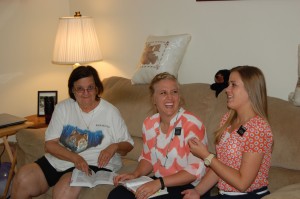 When the “day in the life” experience came to a close, I expressed how every day presents an opportunity for growth. “So, what did you learn today?”
When the “day in the life” experience came to a close, I expressed how every day presents an opportunity for growth. “So, what did you learn today?”
Moore, who remarkably is only a few weeks into her first area, sounded like a confident veteran. “Everything happens for a reason. We don’t know how everything is going to play out, but it doesn’t matter, because God knows. We weren’t meant to have that first appointment. We ended up being in the right place at the right time to share the gospel with others.” Moore also expressed her gratitude for a companion with an unrelentingly positive attitude. “I cannot imagine a better trainer.”
Swisher, at the other end of her mission, learned plenty, too. “Plans don’t always work out. In fact, they rarely work out exactly how you wanted. But this doesn’t mean failure. It means you tried your best, but it wasn’t where you were supposed to be. When plans have fallen through on my mission, usually unexpected opportunities come. I’ve also learned how I’ve developed unconditional love for people I hardly know. I might only meet someone once, but I love them and want the best for them and their families.”
When I finally returned home, I relayed the details of the day, and my wife asked, “So, what did you learn?”
Of all the differences in the work we observed that day (and there were many), I was reminded that the similarities are all that matter. It’s the same spirit at their side, the same unconditional love and the same faith.
In places like little Woodstock, Virginia, and perhaps where you live, missionaries don’t have hundreds of thousands in their paths every day. But they love each and every one with the same spirit and joy as every other missionary in every other area.
And while they might only have 42,000 in their sights, at the speed Moore, Swisher, Kuhn and Jensen work, they could find them all.
And if they do, it just might happen one flea market, one stroller and one jogger at a time.
